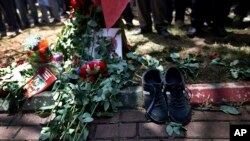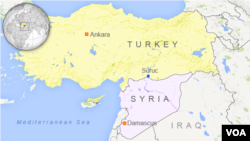Student activists from towns across Turkey who had traveled to the border town of Suruc were waving banners and chanting their support for Syria’s Kurds when a blast struck Monday, killing at least 31 and wounding nearly 100 others.
The explosion was captured on video with footage of the grisly aftermath bringing home the horror of the attack, possibly by a teenage female suicide bomber, that left the screaming survivors dazed and nursing gruesome wounds.
The bombing Monday in the small Turkish town just across the border from Syria’s Kobani, the flashpoint Kurdish town that withstood a months-long siege by Islamic extremists, looks to be the handiwork of the Islamic State. Turkey’s Interior Ministry described the blast as a "terrorist attack" and vowed to bring the perpetrators to justice. A Turkish official said they suspected the bomber was an 18-year-old woman.
"We call on everyone to stand together and remain calm in the face of this terrorist attack which targets the unity of our country," the Interior Ministry said in a statement.
Bombings in Kobani
The extremists have been pummeling nearby Kobani with suicide bombings the past few weeks in a bid to distract mainly Kurdish-led forces, who have made inroads recently into IS territory and have threatened to launch an attack on the militants’ Syrian capital of Raqqa.
As the blast detonated in Suruc there was a simultaneous bombing Monday in Kobani 10 kilometers away. A suicide bomber there targeted a Kurdish checkpoint killing two militiamen, according to the monitoring group the Syrian Observatory for Human Rights.
Monday’s Kobani blast is strengthening suspicions that IS was behind the bombing in Suruc, Turkish officials say.
The explosion in Suruc ripped through the garden of a cultural center where Turkish and Kurdish activists from the Federation of Socialist Youth Associations had just eaten before heading to Kobani to build a library and playground in the ruined town, part of a publicity exercise to pressure Turkey and Western powers to do more to rebuild devastated Kobani. A video posted on Facebook by one of the youth activists after the blast showed 20 people lying on the ground, some still alive.
Eyewitnesses say the force of the blast rocked the small center of Suruc, shattering windows, setting off a fire and panicking Kurdish refugees gathered in the main square in the shadow of a stone pomegranate, a fruit Suruc is famous for growing. More than 30,000 refugees from Kobani and surrounding villages still live in a tent camps in Suruc.
Concern among Turkish leaders
The fear now among Turkey’s leaders is the Islamic extremists won’t stop with Suruc and the bombing could herald more attacks along the Turkish side of the border as a warning to Ankara not to intervene militarily in Syria, as Turkish President Recep Tayyip Erdogan has threatened to do recently.
"If it is Daesh [IS], it will not stay in Suruç,” Muhsin Kızılkaya, a lawmaker from Turkey’s ruling Justice and Development Party (AKP) told reporters. “Very soon we could end up like Syria," he added.
Last month Turkish leaders reinforced the border, deploying additional troops and armor as concerns mounted about the risk of spillover as fighting between Kurdish forces, rebel groups, Syrian government troops and Islamic State militants intensified.
Ankara warned it would retaliate if Turkey’s security is threatened by either Islamic extremists or Syrian Kurds along border. Ankara fears the Kurds will try to establish their own state in northeast Syria, and for many in President Erdogan’s party the Kurds represent a bigger long-term threat than the Islamic State.
Turkish press reports suggested Erdogan was eager to launch a broader go-it-alone intervention to establish a buffer zone inside Syria, but without U.S. support and reluctance from Turkey’s military, Prime Minister Ahmet Davutoglu tamped down war fever.
“If we ever reach a conclusion that Turkey's borders are under any threat, our country is ready for any contingency and it has done everything necessary for that readiness,” Davutoglu said last month in Istanbul.
But the drums of war were beating a little louder again Monday in the wake of the Suruc bombing.
Deputy Prime Minister Yalçın Akdoğan, the first senior government official to make a public statement concerning the attack, tweeted, “These terrorist attacks aimed at Turkey, our nation’s unity and integrity and serenity and peace will not achieve their goal in any way.” He vowed, “the state, the government and the nation” will foil the attacks.
This isn’t the first bombing to hit southern Turkey. In August 2012 the larger city of Gaziantep, an hour’s drive west of Suruc, was struck during celebrations to mark the end of the holy month of Ramadan. The remote-control triggered bomb exploded near a police station in one of the city’s most crowded districts killing 10 and wounding 69. Turkish officials accused the outlawed Kurdistan Workers’ Party of planting the bomb, which the group denied.
Terrorism on Turkish soil
In May 2013 two car bombs exploded in the town of Reyhanli, killing more than 50 and wounding 140 in the deadliest single act of terrorism to occur on Turkish soil. Turkey accused Syrian intelligence operatives of being behind the attack, but IS claimed responsibility, threatening further terror attacks against Turkey
The Suruc attack has come just days after Turkish authorities started to expand their role against IS, the Erdogan government has been accused of helping jihadists in its determination to oust Syrian President Bashar al-Assad. Last week, Turkish security forces arrested dozens of suspected militants in the most significant action by Ankara against the terror group.
Turkey has come under Western pressure to tighten security along its 500 kilometer border with Syria to cut the flow of foreign recruits trying to join the Islamic State or other jihadist groups. Ankara has always vehemently dismissed claims of Turkish collusion with jihadists and have counter-argued that until the Assad regime is toppled, extremism will thrive.
Erdogan’s domestic critics have charged also that his government has to some degree helped the rise of Islamic militants. At the very least, Turkey has turned a blind eye to them as they emerged in the Syrian civil war and increasingly formed the vanguard in the fight to topple Assad. Some critics argue that Turkey’s intelligence agencies have gone farther and actively channeled arms supplies to the jihadists.
Last year, Bayram Balci, a scholar at the Carnegie Endowment in Washington, D.C., wrote in a study: “While Turkey can hardly be considered the direct father of the Islamic State, Ankara’s policy since the escalation of the Syrian crisis has contributed to strengthening jihadism in both Iraq and Syria.”
In the south of the country there has been sympathy for jihadists battling in Syria along the border. Local officials in Turkey’s southeast province of Şanlıurfa express privately their admiration for IS, seeing the group as a counterweight to the Kurds. Some make clear they would rather have the jihadists for neighbors than the Kurds.
In Gaziantep and other border towns there has been a jump in the number of Islamic associations encouraging young Turkish boys to wage jihad. Local police officials have told VOA they suspect Quran-reading associations like “Genç Müslümanlar” (Young Muslims) and the “Furkan" group have been recruiting youngsters for IS.





